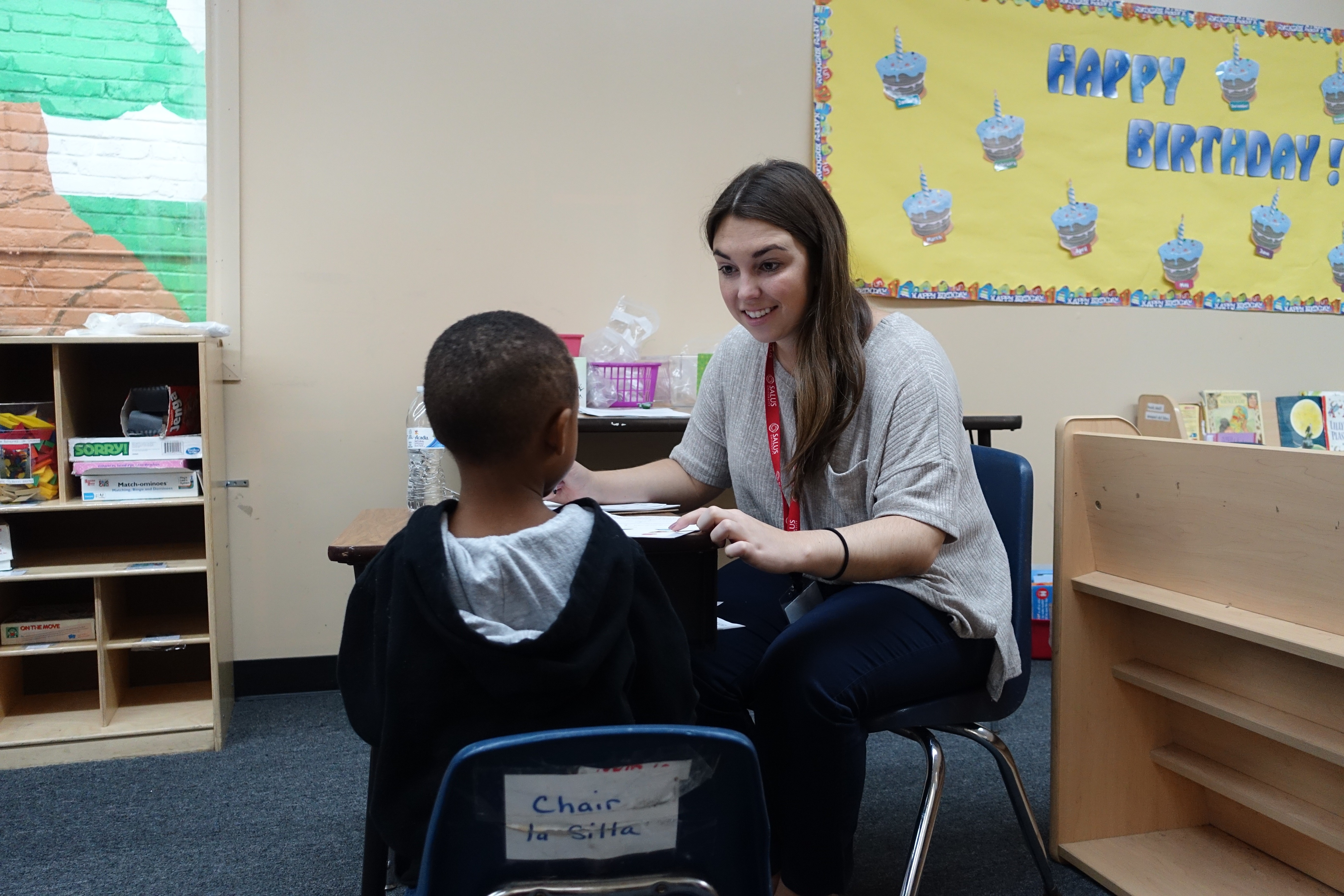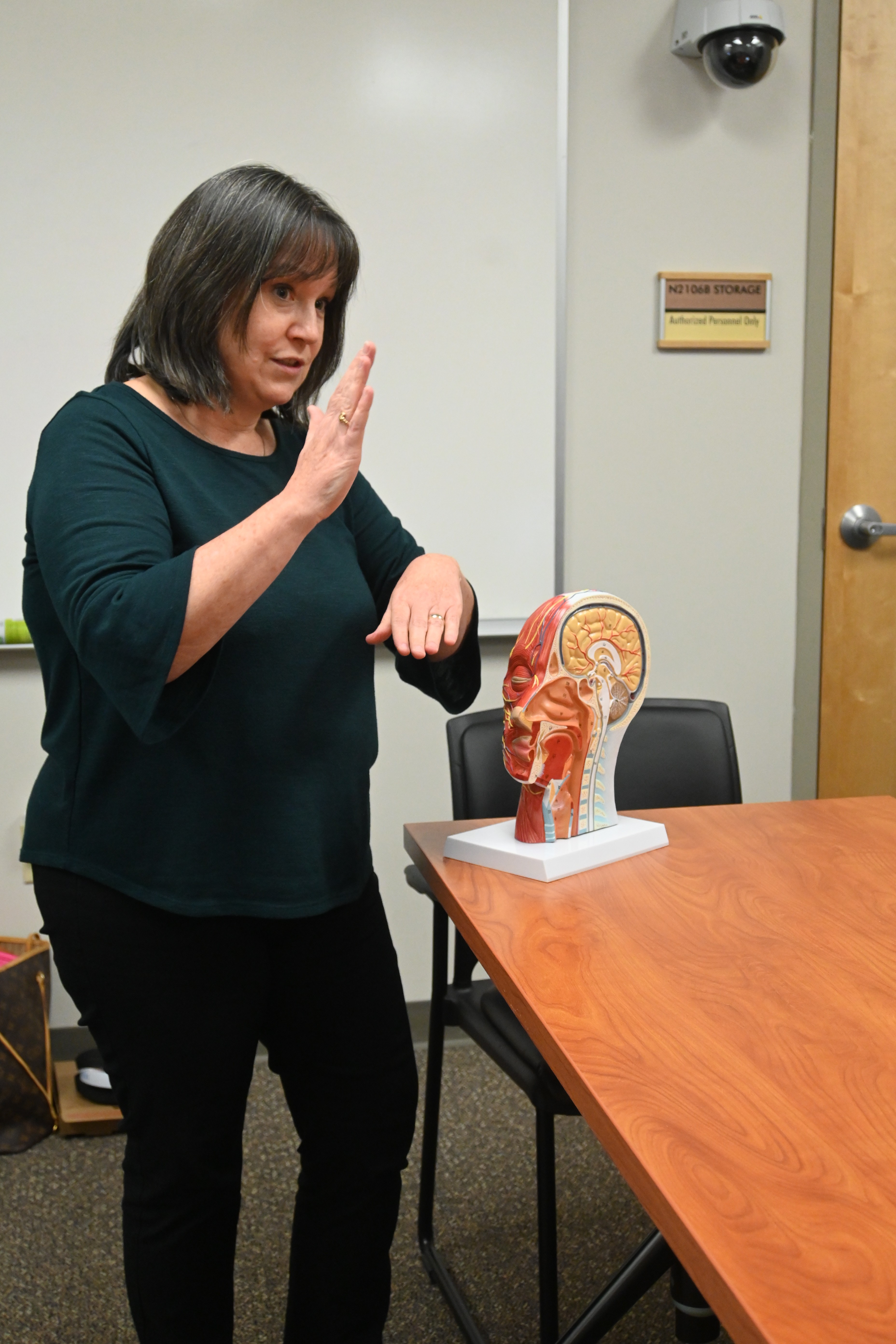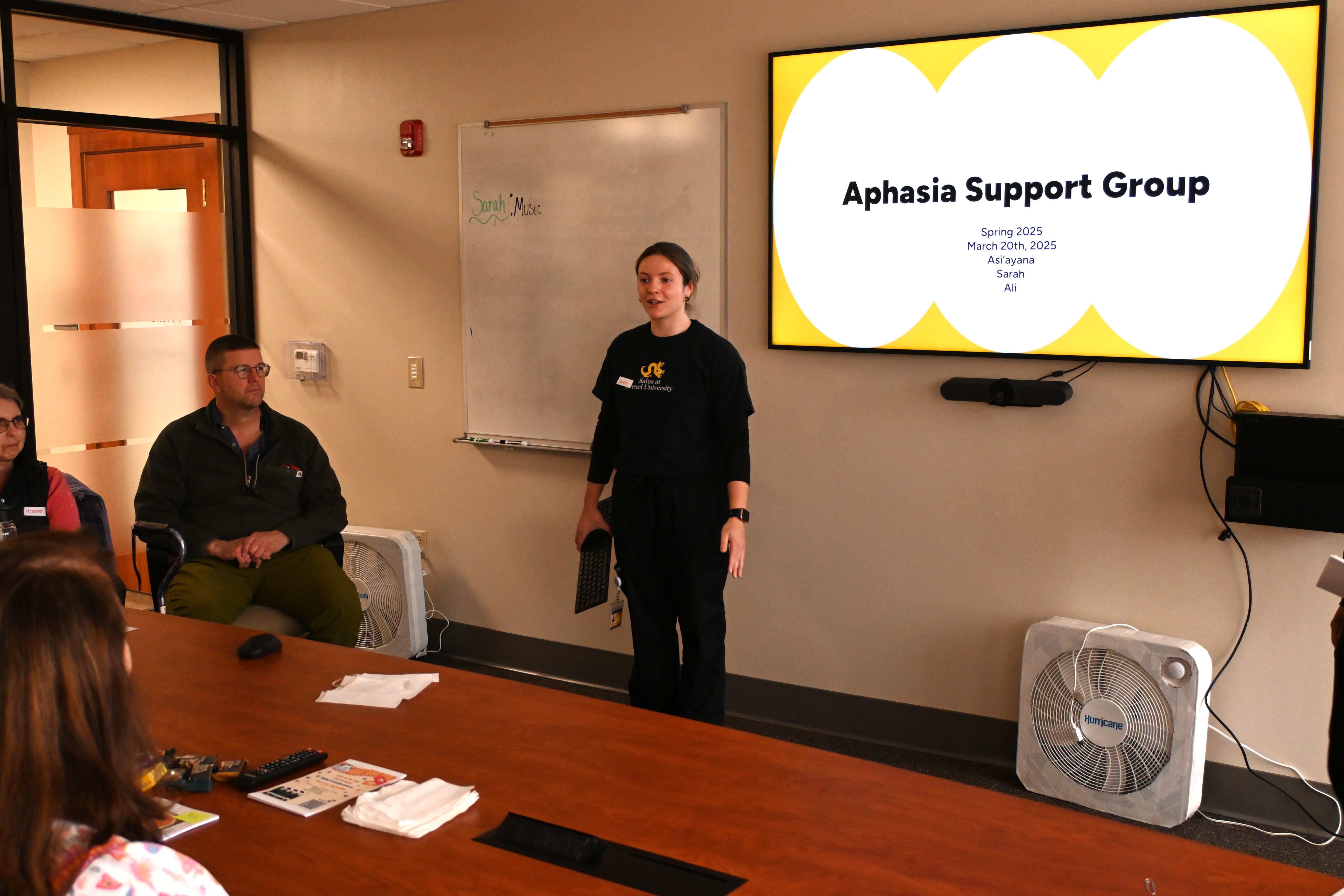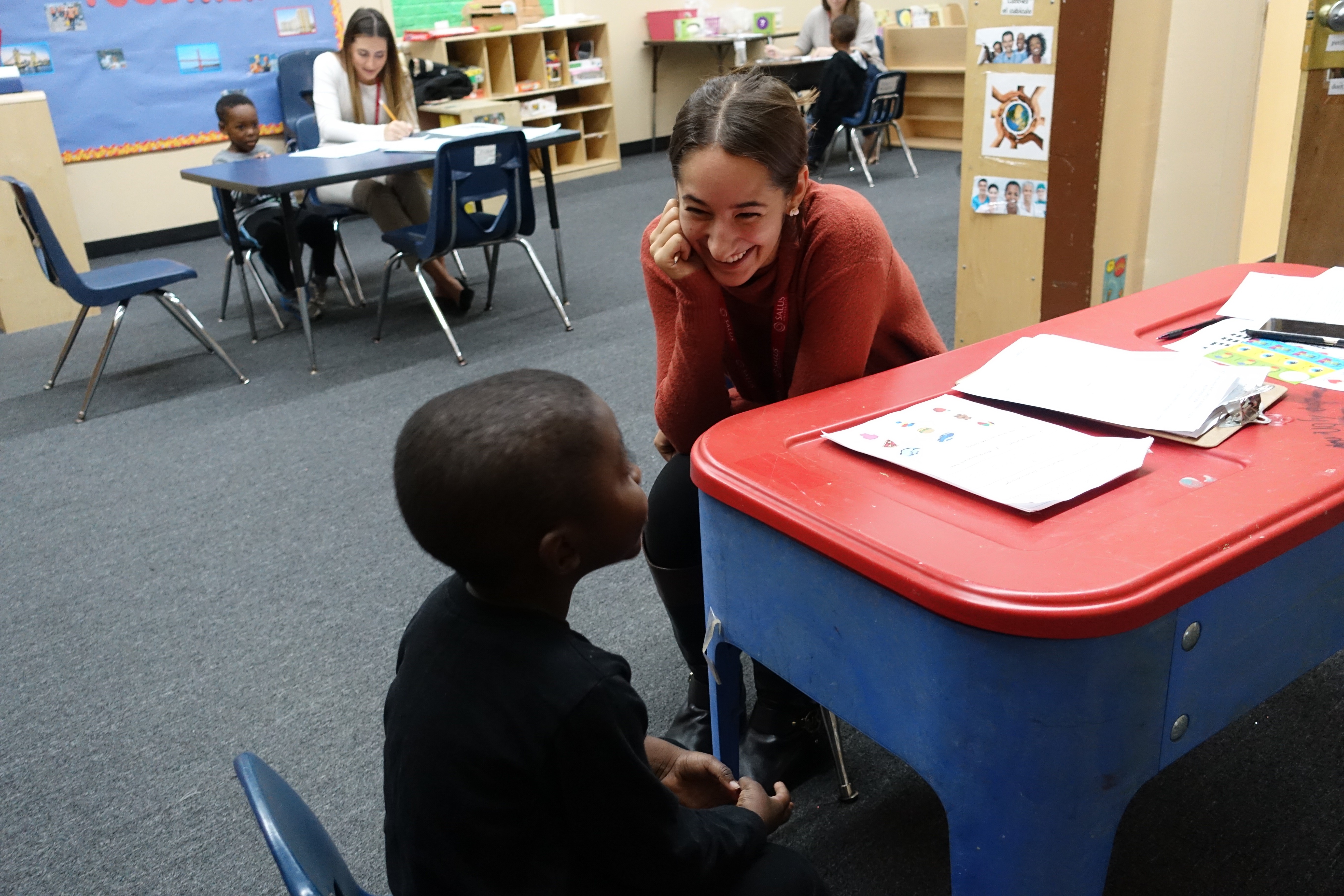Beyond Therapy: Speech-Language Institute Offers Expertise, Hope

Language has always been a struggle for 12-year-old LJ McGovern. According to his mother, Allison Maurer, LJ has a genetic disorder that severely limits his speech. To communicate, he makes sounds and gestures and uses Augmentative and Alternate Communication (AAC) devices.
In addition, LJ has been diagnosed with 1p36 deletion syndrome – fewer than 25 percent of children with this condition ever talk – as well as severe to profound autism and has been in early intervention services since he was six months old. Over the years, his mother said, she hadn’t seen as much progress with LJ as she would have liked.
 Then in 2022, she found the Speech-Language Institute (SLI) and Patricia Mayro, MA, CCC-SLP, a clinical educator at SLI. For more than a year, Mayro worked with LJ on articulation and being able to utilize his sounds and speech appropriately, particularly on isolating the “M” sound because it was one of the natural sounds he made.
Then in 2022, she found the Speech-Language Institute (SLI) and Patricia Mayro, MA, CCC-SLP, a clinical educator at SLI. For more than a year, Mayro worked with LJ on articulation and being able to utilize his sounds and speech appropriately, particularly on isolating the “M” sound because it was one of the natural sounds he made.
And, now LJ is able to say the word “Mom.”
“One time when he was in the bathtub we were able to isolate the ‘M’ sound. I brought that to our next session at SLI and he was able to mimic it again and we were able to grow that,” said Maurer. “And, ‘Mom’ is the only word he’s been fully able to articulate.”
It’s a big success story for LJ, his mother and SLI. It is the perfect example of how the clinical facility, which is celebrating its 10th anniversary this year, has been the crown jewel of the Speech-Language Pathology (SLP) program at Drexel University, which completed its merger with Salus University in July 2025.
Along with offering Master of Science in SLP students early clinical exposure, it also serves the surrounding communities as a free clinical site helping clients and families strengthen their communication and overall quality of life.
“The experiences that we’ve had over the years with some of the students have been positive,” said Maurer, MSW, LSW, who also is chief executive officer of the Adult Services Division of the Autism Cares Foundation, Inc., in Southampton, Pennsylvania. “That’s me judging how LJ’s reaction is to the students. He’s enthusiastic and happy to see them.”
Maurer added that being able to be part of the learning experience for the students is important because these are the individuals who will be interacting in the future with clients like LJ. “One of the things that makes me love LJ even more is that you can talk to him about it. He is aware and able to understand so much,” said Maurer. “He actually does enjoy taking part in these sessions and taking the time afterwards to watch me interact with some of the students.”
According to Kara Maharay, MS, CCC-SLP, BCS-S, clinical director at SLI, the clinic is the heart of the SLP program and is the biggest draw for incoming Master of Science students.
 “My favorite thing about the clinic is that it is free, and that brings a lot of benefits, not only to the community but to our students,” said Maharay. “For our community, it allows people to come here free of charge, so that means those who couldn’t otherwise receive services can come and receive treatment. And, for our students, the goal is to provide them with a very diverse clinical experience right from the first semester. This allows us to be able to select clients to provide that diverse and perfect experience for the students. By graduation, they have gained experiences working with every age group and a wide range of diagnoses.”
“My favorite thing about the clinic is that it is free, and that brings a lot of benefits, not only to the community but to our students,” said Maharay. “For our community, it allows people to come here free of charge, so that means those who couldn’t otherwise receive services can come and receive treatment. And, for our students, the goal is to provide them with a very diverse clinical experience right from the first semester. This allows us to be able to select clients to provide that diverse and perfect experience for the students. By graduation, they have gained experiences working with every age group and a wide range of diagnoses.”
Over the years, SLI has grown its community outreach services as well. Clients can now participate in support groups – the Aphasia Support Group, Read Between the Lines Book Club, and the Finding Our Words Poetry Club – started by Ali Finkelstein, MA, CCC-SLP, recently retired clinical educator at SLI. Facilitating the clubs serves as part of the clinical training for the students.
“We asked ourselves, ‘What other therapy experiences are important for our clients and students?’ The clients were benefitting from individual treatment provided by our students. But what about the real-world experiences that help clients with their life participation goals?” said Finkelstein. “These support groups have brought the real world to the clients and have given students the opportunity to learn supportive group facilitation techniques.”
Maharay noted that one of her key takeaways is recognizing how many adults have lived an independent life until a life-changing event drastically impacted their abilities. “It’s really hard for them to come to therapy - they are being challenged with something that used to come easy for them,” said Maharay, who became director of SLI in late 2021. “They are working with students who are doing a great job and spending lots of time preparing, but I think in many ways, their comfort level is better because they are working with a student who is also learning. It’s a really nice collaboration. It’s a student and client learning and growing together and I think that boosts the confidence of both.”
 Students are also working with the families of their clients. Maharay said clients are comfortable with the relationships they develop with the clinical educators and students. “The nice thing about our clinic, which is different from the other clinics (The Eye Institute and the Pennsylvania Ear Institute), is that we see people on an ongoing basis,” said Maharay. “People get comfortable here and the relationships they build are strong. When you can build that rapport, that’s half the battle.”
Students are also working with the families of their clients. Maharay said clients are comfortable with the relationships they develop with the clinical educators and students. “The nice thing about our clinic, which is different from the other clinics (The Eye Institute and the Pennsylvania Ear Institute), is that we see people on an ongoing basis,” said Maharay. “People get comfortable here and the relationships they build are strong. When you can build that rapport, that’s half the battle.”
For LJ and his mother, SLI has provided them not only with the clinical care and expertise while receiving therapy, but has filled them with hope after they leave too. “To leave a therapy session with hope, it’s hard to describe,” said Maurer. “And, having a glimpse of hope that you're doing the right thing for your child is indescribable. I know in my heart that he may never have a conversation, but I know that he's now able to create awareness for people around him, which is massive when you have someone who is silent almost his entire life.”
Much of the credit, Mauer shared, is a direct result of the faculty, clinical directors and students at SLI. “I credit them with providing me with a child that can say my name, ‘Mom,’ and for giving me the motivation to continue pushing him forward,” she said.